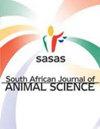The effect of pre-slaughter electrical stunning on bleeding efficiency, meat quality, histology, and microbial count of several goat muscles
IF 0.6
4区 农林科学
Q3 AGRICULTURE, DAIRY & ANIMAL SCIENCE
引用次数: 1
Abstract
This study was designed to compare the effect of non-electrical stunning and electrical stunning on bleeding efficiency, meat quality characteristics, bacterial count, and histology of longissimus thoraces, semitendinosus, biceps femoris, infraspinatus, semimembranosus, and triceps brachii muscles of goats. Forty goats were randomly divided into two groups: electrical stunning and non-electrical stunning with 20 animals each. Low frequency head-only electrical stunning of 1 Amp for 3 s at a frequency of 50 Hz was used. The slaughter was performed by severing the carotid artery, jugular vein, trachea, and oesophagus. Six muscles were kept in a chiller at 3–4 ºC for 24 h before quality measurements. Samples from the infraspinatus, longissimus thoraces, and semitendinosus muscles were preserved to evaluate histological features. Muscle samples from the non-electrical stunning group had substantially higher blood loss and lower bacterial counts after 72 h across the six muscles compared to the electrical stunning group. No significant differences in meat quality parameters were evident between the two groups. The stained sections of the electrically-stunned muscle samples detected alteration phenomena due to the presence of muscle fibres with split myofibres and myofibres with central rather than peripheral nuclei. Electrical stunning prior to slaughter increased bacterial contamination, decreased blood loss, and altered the position of muscle nuclei.宰前电休克对几种山羊肌肉出血效率、肉质、组织学和微生物数量的影响
本研究旨在比较非电休克和电休克对山羊胸最长肌、半腱肌、股二头肌、冈下肌、半膜肌和肱三头肌的出血效率、肉质特性、细菌计数和组织学的影响。40只山羊随机分为电休克组和非电休克组,每组20只。使用频率为50 Hz,频率为1安培,持续3秒的低频头部电击。屠宰是通过切断颈动脉、颈静脉、气管和食道来进行的。6块肌肉在3-4ºC的冷冻机中保存24小时,然后进行质量测量。保留冈下肌、胸最长肌和半腱肌的样本以评估组织学特征。与电击组相比,非电击组的肌肉样本在72小时后的6块肌肉中失血量明显更高,细菌数量也更少。两组间肉质参数无显著差异。电晕肌肉样本的染色切片检测到由于存在分裂的肌纤维和具有中央而不是周围核的肌纤维而引起的改变现象。屠宰前电击会增加细菌污染,减少失血,并改变肌核的位置。
本文章由计算机程序翻译,如有差异,请以英文原文为准。
求助全文
约1分钟内获得全文
求助全文
来源期刊

South African Journal of Animal Science
农林科学-奶制品与动物科学
CiteScore
1.50
自引率
0.00%
发文量
39
审稿时长
>36 weeks
期刊介绍:
The South African Journal of Animal Science is an open access, peer-reviewed journal for
publication of original scientific articles and reviews in the field of animal science. The journal
publishes reports of research dealing with production of farmed animal species (cattle, sheep,
goats, pigs, horses, poultry and ostriches), as well as pertinent aspects of research on aquatic
and wildlife species. Disciplines covered nutrition, genetics, physiology, and production
systems. Systematic research on animal products, behaviour, and welfare are also invited.
Rigorous testing of well-specified hypotheses is expected.
 求助内容:
求助内容: 应助结果提醒方式:
应助结果提醒方式:


